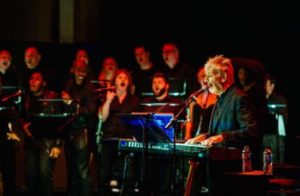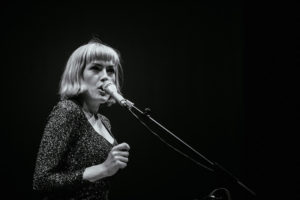 (4 / 5)
(4 / 5)
The selection of John Cale for the opening night of Cardiff’s fledgling Festival of Voice was an act of enlightened curation. Few singers other than John possess a voice imbued with such intrigue, both heavy and complex with the weight of its vital musical history, and yet warmly inviting with its simple richness.
With 2016 marking fifty years since the recording of The Velvet Underground’s first album, “The Velvet Underground & Nico” it would be easy for John Cale to lean on those old tunes, giving simple gratification to fans who still hold those early experiments with rock’n’roll (and all else that entailed) as his pinnacle. But ‘easy’ is rarely a path Cale has taken. An inspiring lecturer on the avant-garde, and a relentless seeker of new frontiers in music such as drone and noise, it was fitting that the only nod to the Velvet Underground in Cale’s two hour set was a heavenly version of ‘Sunday Morning’ twisted by transplanted and warped instrumentation.
https://youtu.be/3qK82JvRY5s
The set illustrated the enormous breadth of Cale’s oeuvre, while subtly highlighting its manifold interconnections. Transitioning from a new offering such as the murky, ascending opener ‘Time Stands Still’ into 1973’s familiar ‘The Endless Plain of Fortune’; or from a haunting, strangely empty rendition of Cale & Lou Reed’s 1990 nostalgic collaboration ‘Style It Takes’ into the desolate ‘Wasteland’ written fifteen years later, Cale wove an enigmatic tale through his performance. The two-hour set rarely ventured from andante, and Cale rarely from behind his keyboard, but interest was held by the addition of string and horn sections, and a choir comprised of gospel and classical singers, apparently instructed simply to ‘sing as they felt’. The appearance of Michael Sheen to perform Dylan Thomas’ ‘Death Shall Have No Dominion’ over a claustrophobic, machine-laden soundscape was a particular highlight, encapsulating Cale’s fraught, unsettled, yet sentimental relationship with Wales.
Opening act Gwenno was captivating, transmitting ethereal, dystopian-themed Welsh language pop vocals and string hooks over an undulating, krautrock revering rhythm section. Gwenno played cuts from her 2015 LP ‘Y Dydd Olaf’, inspired by obscure Welsh sci-fi novelist Owain Owain.
Her marriage of inhuman synthesised sounds with the Welsh and Cornish languages was an engaging metaphor for the continual transformation and creative resistance of marginal identities under modernity.


